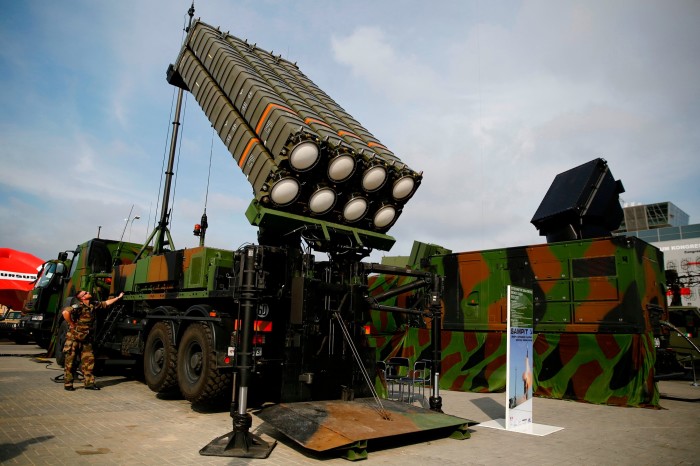France is challenging a German-led plan to build air defenses in Europe, in another sign of brewing tensions over how the region will confront the threat posed by Russia.
The spat will set the backdrop for an air defense strategy conference in Paris on Monday, which aims in part to regain momentum from the Berlin-backed European Sky Shield initiative, the launch of which surprised French officials last year.
President Emmanuel Macron held it on the sidelines of the Paris Air Show, and French officials described the event as a forum for discussion between EU defense ministers, US and NATO military officials, and industry executives.
But Macron’s push also reflects more fundamental differences between Paris and Berlin on how to urgently bolster military defenses against Vladimir Putin’s Russia while bolstering Europe’s industrial base.
German Chancellor Olaf Scholz unveiled Sky Shield last October to create a European air and missile defense system by jointly purchasing the equipment, and 17 countries have since signed on, including the United Kingdom, the Baltic states, Sweden and Finland.
Olaf Scholz, left, and Emmanuel Macron at a meeting earlier this month have wide differences of opinion on military defense © Ludovic Marin / AFP / Getty Images
Russia’s invasion of Ukraine and its massive use of munitions and missiles to attack from the sky was a wake-up call that Europe could no longer afford to neglect its air defenses. “We have a lot of catching up to do in Europe,” Scholz said in an August speech outlining his vision for air defense.
But major countries such as France, Italy and Poland remained on the sidelines, showing the challenges of overcoming national industrial interests even as military budgets ramped up across Europe. Paris was particularly surprised by Sky Shield’s announcement and postponed a Franco-German summit in part to signal its anger.
While French and German officials have avoided public criticism of each other’s plans, the differences are evident behind the scenes. Germany initially planned to send a senior official in place of Defense Minister Boris Pistorius, but changed course over the weekend.
Macron implicitly criticized Sky Shield for relying too much on weapons systems manufactured outside Europe, while not thinking enough about how best to deter Russia, including by acquiring long-range missile attack capabilities.
In a recent speech, Macron said that air defense “is first a strategic issue before it becomes an industrial issue, but it is clear that it must be based on a balance between offensive measures and defensive measures.”
“When I see certain countries increase their defense spending to buy non-European systems on a massive scale, I simply tell them: ‘You’re preparing for tomorrow’s problems! ‘”
In Berlin, officials see French criticism as unfounded, and argue that the urgent need to fill gaps in air defenses means that buying “off-the-shelf” systems is better than “long and often expensive” new developments. In a letter of intent sent to NATO last year seen by the Financial Times, countries participating in Sky Shield agreed to “practical solutions” to “enable rapid progress” in air defences.

Germany has signed a batch of Iris-T air-to-air missiles from its own manufacturer Diehl for €900m © Diehl Defense via ABACA / Reuters
Although countries in the Sky Shield each make their own procurement choices, Germany has said it plans to buy domestically manufactured Diehl-class Iris-T missiles for medium-range protection, Patriot missiles from US-based Raytheon Technologies, and Arrow 3 missiles. From Israel a very long distance. Last week, the German parliament approved the first purchases: a batch of six Iris-T units for 900 million euros and the first tranche of money in a $4.3 billion deal for Arrow 3 missiles.
In Paris, the exclusion of the Franco-Italian SAMP-T missile defense system manufactured by MBDA and Thales, which serves a similar range to the US-made Patriot system, proved a sore point.
“France is upset that Sky Shield relies so much on American and Israeli technology when there is a European alternative, and that the project has in fact left southern Europe,” said Shaheen Valli, a former Macron adviser who works for the German council. in foreign relations.
A French official denied that these competitive concerns were motivated by Paris. The conference was not meant to undermine Skyshield, the person said, but rather to hold a much-needed discussion about the broader strategy of how to protect European skies, including the role of NATO and the EU as well as nuclear deterrence. by France and others.
A second French official pointed to the risk that spending billions on air defense systems could spark a new arms race with Moscow.

About 20 ministerial-level officials, along with representatives from NATO and the United States, are expected to attend the conference.
No specific deals expected at the conference. But Macron is expected to speak at the end, and Paris may hold similar events in the future.
One of the senior Western officials whose country is participating in the Sky Shield initiative was not enthusiastic about the French maneuvering with the conference. “It’s confusing and hard to understand why the French feel the need to do this,” said that person. “The whole point is there are no competing ideas.”
Within NATO, the Sky Shield initiative is seen as a positive step towards better interoperability and unified defense platforms, the lack of which the war in Ukraine revealed. Countries’ weapons often don’t work together smoothly and armies can’t always resupply their allies.
Pistorius said it was important to him that the Sky Shield initiative not be seen as a competition to NATO or the European Union.
“Everything that is bought can be integrated into the existing structure,” he told the Financial Times. “You can see from this that we are not in competition with the French conference in Le Bourget.”

